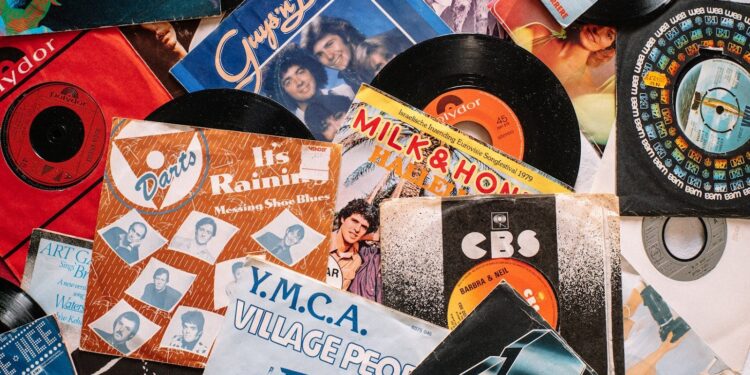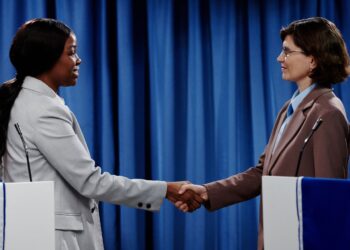By Rowan Ashcroft
I was asked sometime in early July to write about The Hidden Thorns, the first and only album released under Ezra Kline’s new moniker, Granite Felt. It was his first proper release in over eleven years, not counting a rare spoken-word appearance on a track by The Mending Flags, which quietly slipped onto Bandcamp in 2018. The new album is beautiful, heartbreaking, strange—familiar to those who followed his early work as lead vocalist and principal writer of the art-folk band Yellow Ghost, but older somehow. More pared down. More defeated. I planned to write about The Hidden Thorns after seeing him play the Riverside Chapel in Chicago. That show was set for August 20th.
It made sense symbolically. The Riverside used to be a Methodist church, then a co-op performance space, and now sits awkwardly between both identities. Ezra, like many of us, was born into a vague and meandering spiritual lineage. His lyrics—always haunted, never haunted enough—have long gestured toward a form of belief that isn’t quite belief, but something nearby. There was a time when I could say without irony that Kline was the most formative artistic influence on my adult sensibility. And I still believe that, though now I say it with the slight embarrassment one uses when admitting to still sleeping with the stuffed animal from childhood.
I had never seen him live. Ezra rarely toured even when Yellow Ghost was active, and he hadn’t performed publicly in over a decade. I thought the show might answer some long-humming questions I had about the relationship between absence and creation. It didn’t. Because it didn’t happen.
On August 14th, six days before the show, Ezra Kline took his own life.
I haven’t known how to write this. I’ve tried structuring it as a track-by-track breakdown. I’ve tried turning it into an ode to Yellow Ghost. I’ve tried pretending it’s a book review of his half-finished memoir, The Body Electric, which his sister found on a hard drive and doesn’t plan to release. What I’ve landed on is less of a review than a meandering elegy. A bit of everything. A little too much of me. But sometimes the only way to write about someone else is to begin with yourself.
The first time I heard Ezra’s music I was 18, huddled beneath a quilt in a college dorm that smelled like cedar and mildew. Someone had left a bootleg cassette of Wilderness Index on a bookshelf. It took me three songs to realize that the man behind these lyrics understood something about sadness I hadn’t yet put language to.
That feeling—the one where beauty and despair are not opposites but siblings—is what kept me returning to Kline’s work. His songs were full of malfunctioning appliances, collapsing porch steps, worn paperback novels, and the specific horror of realizing you’ve built your life around a person who might not exist. He wrote as if the world were a barely-maintained motel run by ghosts.
For years, whenever I got stuck writing, I’d return to The Ascension Couch—Kline’s 2009 solo EP that features the line: “I called the phone company to cancel memory.” It helped. It didn’t fix anything. But it helped.
The Hidden Thorns opens with the track “Nice Things Will Rot Too.” Kline’s voice—still cracked, still strangely melodic—glides over a bare piano figure, delivering: “I framed a love note from someone who never existed / watched the ink dry like blood on a birth certificate.” The line is both clever and devastating, and it tells you exactly what this album is: not a rebirth, not a comeback, but a final address from a man who never stopped speaking to shadows.
By the time the record reaches “Burn Rate,” the sixth track, it’s hard not to hear it as a farewell. In a verse that somehow rhymes “snowplow grief” with “late autumn teeth,” Kline sings: “I’ve been sharpening myself against goodbye.” That line alone stayed with me for weeks. It still does.
The record is full of odd, broken prayers. One of them, “Saint Nothing,” is a nearly a cappella meditation on silence and mistakes, ending with a line that could serve as a thesis for Kline’s whole body of work: “Grace never knocked, but guilt sent flowers.”
I have been thinking, lately, about how memory ruins us. How it lifts and flattens, returns and deceives. I’ve started having moments where I round a corner, or step into a building I haven’t visited in years, and am met with a memory so vivid it makes the present uninhabitable.
Last month, while walking with my father through a hardware store, I stopped mid-aisle. The fluorescent lights, the sound of the intercom, the faint smell of fertilizer—it was all too much. I was reminded of standing in a different hardware store with a different version of myself. It was like being handed your own obituary and asked to proofread.
Ezra’s music, more than anything else, has become the soundtrack to this phenomenon. He wrote not about events, but the echoes they left behind. The kind of person who can’t stop asking: How did we end up here?
The final track on The Hidden Thorns is called “This Is Not the Ending.” It’s barely more than a whisper, a three-minute lullaby where Ezra hums through most of the verses. But one lyric breaks through clearly: “You only get one last word, so say it slow.”
I don’t know if Ezra Kline planned The Hidden Thorns as his last record. I don’t know if he knew the fire he started wouldn’t warm him, only the rest of us. But I know that when I listen now, something in me both breaks and rebuilds.
A few weeks ago, I spoke with the poet Lena Huerta at a reading in the back of an old dance studio. It was for a chapbook launch. We ended up in a stairwell, trading stories about artists who vanish. She told me she once met Kline at a friend’s wedding in Baltimore. He was quiet, kind, holding a glass of ginger ale like it might shatter if he blinked too hard.
“He quoted Zukofsky during the toasts,” she said. “It was… weirdly lovely.”
After the reading, I stood alone in the parking lot for a while. The wind had picked up. My car’s windows were fogged. I turned on the stereo and let The Hidden Thorns play all the way through.
When it ended, I didn’t cry. I just sat there, the engine off, hoping maybe someone would walk past and ask what I was listening to. So I could say, “Ezra Kline. He made beautiful things. You’d like him.”
If you’ve made it this far, maybe you do.Author Bio
Rowan Ashcroft is a poet and critic living in upstate New York. His work has appeared in Gossamer Review, Margin Notes, and various pamphlets stapled to cork boards in bookstores that smell like rain. He writes about music, memory, and the people who leave us too soon.












